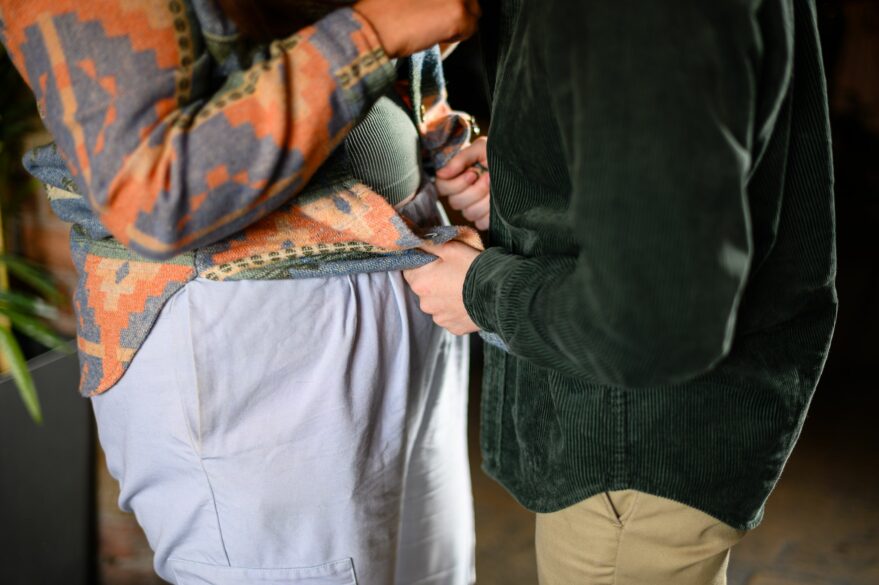
Genital Herpes is caused by the Herpes Simplex Virus (HSV). It can be passed on from one person to another through penetrative sex –oral, vaginal and anal – as well as skin-to-skin contact. HSV is a long- term condition which can be treated but not cured.
How is genital herpes passed on?
The virus is highly contagious and spreads from one person through skin-to-skin contact, such as during vaginal, anal or oral sex. Wherever HSV is on the surface of your skin it can be passed onto a partner, regardless of gender or sexual orientation
It is passed on during sexual contact and this can happen before, during and immediately after an outbreak. It is easier to catch when the infected person has blisters or sores. However, it can be caught at any time, even when someone has no symptoms at all.
It can be passed on from one person to another through:
- Unprotected vaginal, anal and oral sex.
- Your genitals coming into contact with your partners.
- If you receive oral sex from someone who has a cold sore or is about to get one.
- Skin-to-skin contact during sex if the virus is active on the skin outside the area protected by a condom or dental dam.
- Sharing sex toys without washing them or covering them with a condom with each use.
- If a person who has whitlows (herpes on the hand) touches a partner’s genital or anal area.
External (Sold as male) condoms and internal (Sold as female) condoms reduce the risk of getting or passing on herpes if they cover the affected area. Wash your hands after touching blisters, especially before handing contact lenses, because herpes can cause an eye infection. Herpes can’t live very long when off people’s skin, so it cannot be passed on from objects like cutlery and cups.
How do I know if I have genital herpes?
Many people who have the herpes virus may not even realise as there may not always be symptoms. If you do get symptoms they may include the following:
- Small fluid-filled blisters that burst to leave red open sores around your genitals, anus, thighs and buttocks.
- Pain when you pass urine –due to urine passing over sores.
- A general feeling of being unwell, with aches, pains and flu-like symptoms.
- Stinging, tingling or itching in the genital or anal area.
- May have vaginal or urethral discharge.
The symptoms may last up to 20 days. It is important to be tested for genital herpes even if you haven’t had sex for a long time as blisters can take months or years to appear.
Although the initial symptoms of genital herpes clear up, the virus remains dormant in a nearby nerve. The virus can reactivate from time to time, causing outbreaks.
If you are showing symptoms visit your local sexual health clinic as soon as possible.
How can genital herpes be treated?
The herpes virus stays in your body for life but antiviral tablets stop blisters to make them heal quicker, and they can be used long-term to prevent symptoms. If blisters appear, pain killing creams and bathing in salt water may help.
When going to check if you have herpes at a clinic, a health professional will ask you about your symptoms, your sexual partners and use a small cotton bud to take some fluid from a blister/sore for testing.
You can’t test for herpes if you have no visible blisters/sores, nor will it tell you how long you have had herpes. Whilst there is no cure for herpes, symptoms will heal up by themselves but can come back (called an outbreak or recurrence). Antiviral medicine can be prescribed by a GP or clinic to help shorten symptoms, and some people never have outbreaks.
For outbreaks, some self-managing remedies include:
- Keeping the blister area clean with salt water to prevent infection
- Soothe with an ice pack wrapped in a towel/flannel
- Apply petroleum jelly (like Vaseline) or painkilling cream to reduce pain when peeing
- Wash hands before and after touching blisters/applying creams
- Pouring water over your genitals whilst peeing to reduce pain
- Avoid sex until all sores have disappeared
Should I test for genital herpes?
You can only have a check-up for herpes when you have signs and symptoms. If you think you have genital herpes for the first time you should visit your local sexual health clinic as soon as possible.
The doctor or nurse will look at the affected area and take a swab of fluid from the blisters. The sample will then be sent to be tested for HSV and you will normally get the results back in one to two weeks.
If you are living with HIV and catch genital herpes, it is important you go to your GUM clinic or GP for support straight away. Not only can having genital herpes increase your risk of catching HIV from a partner, but if you are already living with HIV, herpes can compromise your immune system even further, risking a higher chance of developing AIDS.
If you or your partner is pregnant and has genital herpes, there is a small risk your baby could develop neonatal herpes. This can be fatal but most babies are easily treated with antiviral treatment. If you have had genital herpes before, this risk is relatively low. See your GP or midwife if you have any concerns.
Protecting Against Genital Herpes
There are a few ways you can reduce the risk or passing herpes on by:
- Using a condom or dental dam whenever you have sex – vaginal, anal or oral
- Avoiding all kinds of sex when you or your partner have sores, blisters or a tingle/itch that means an outbreak is coming
- Not sharing sex toys, or washing and using new condoms every time you use them with a partner
Genital herpes is caused by a virus that stays in your body once you have caught it. Whilst it won’t spread blisters all around your body during breakouts, there are some triggers you can avoid that may cause another breakout. This includes:
- Ultraviolet light, like from sunbathing or sunbeds
- Friction in the affected area from sex (lube can help this) or from tight clothing
- Smoking
- Alcohol
Get Support From Us

BHA For Equality
0330 128 1186
Free & confidential sexual health services for Black, Asian, and Minority Ethnic communities.

George House Trust
0161 274 4499
Free & confidential support, advice and advocacy services for people living with HIV.

LGBT Foundation
0345 3 30 30 30
Providing advice, support and resources for LGBT people to take control of their sexual health and wellbeing.
